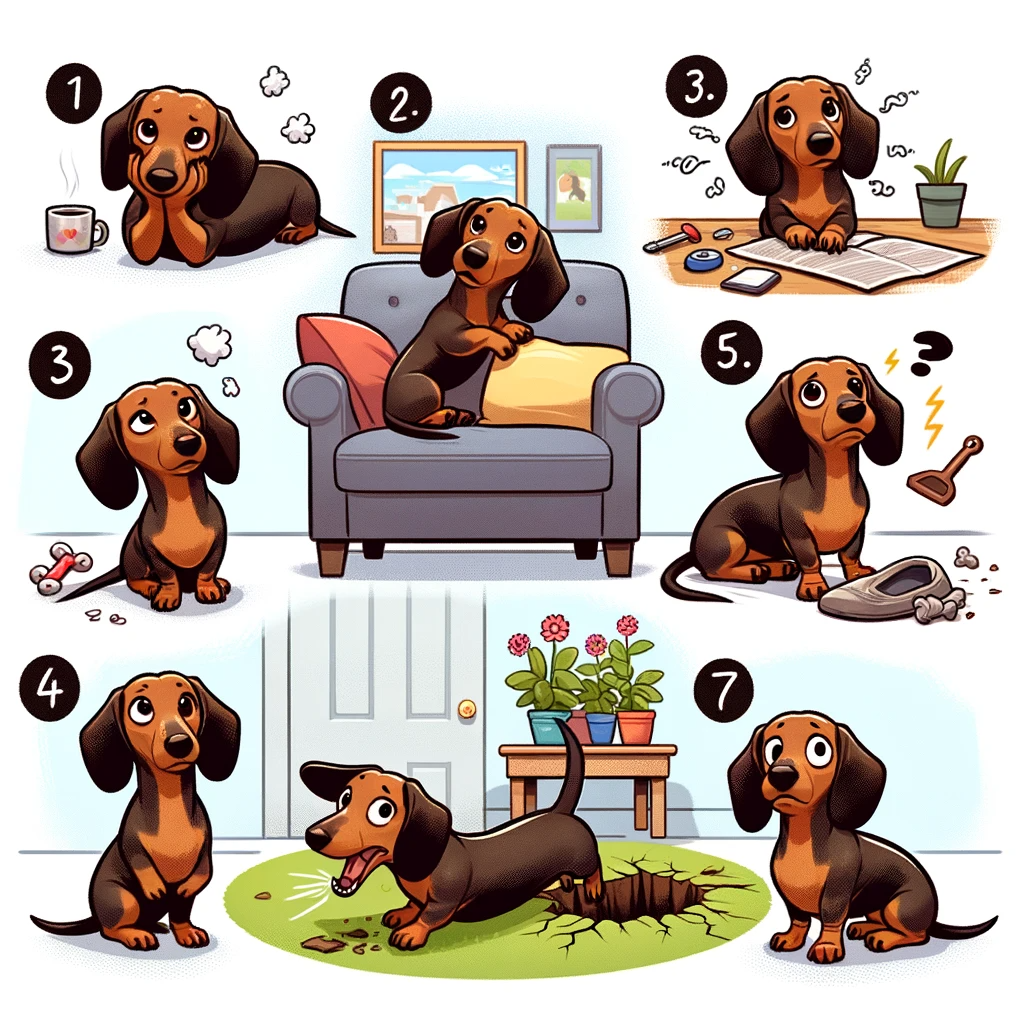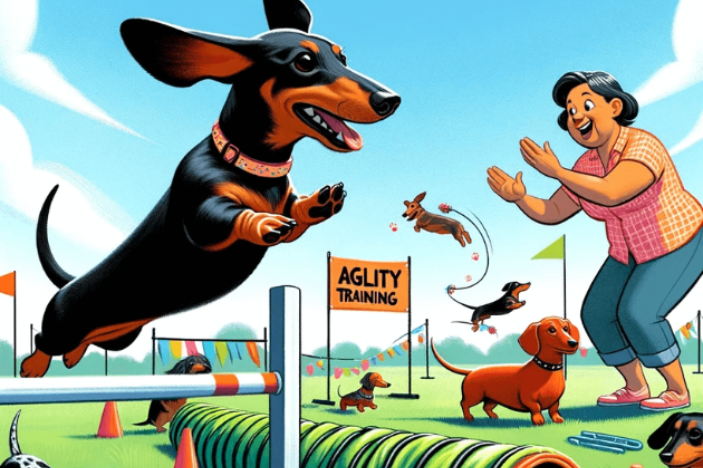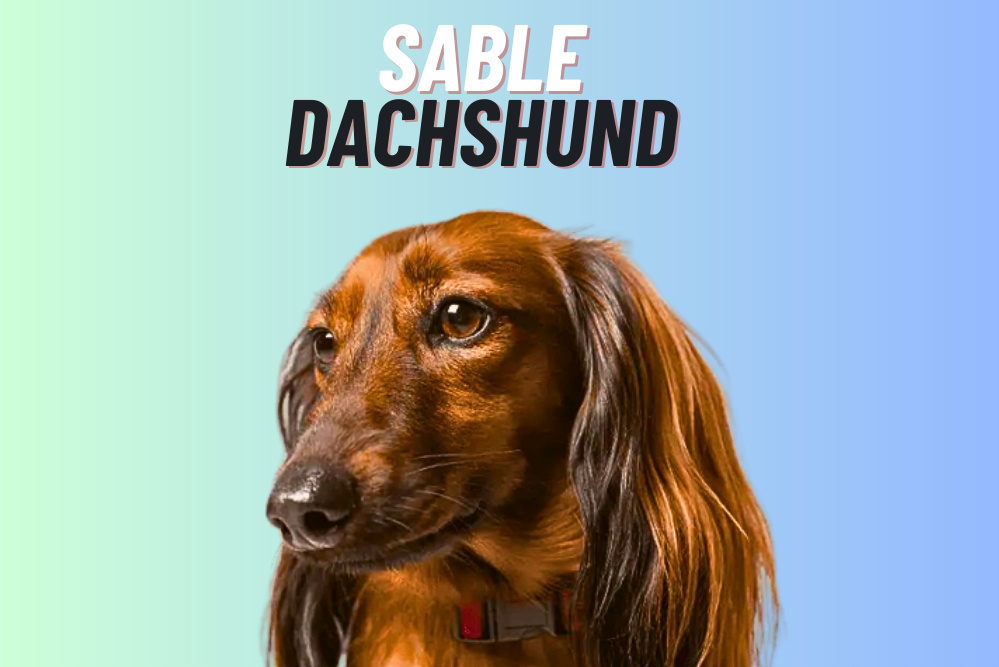Get ready for an incredible and thrilling adventure as you welcome a cute Dachshund puppy into your home! These adorable little fellows, also known as wiener dogs, wiener dogs are a popular breed cherished for their distinctive long bodies, playful nature, and loyal temperament. However, like any other puppy, Dachshunds require proper training to ensure they grow into well-behaved and obedient adult dogs
Dachshund puppy training is essential for establishing a strong bond with your furry companion and creating a harmonious environment. Training your Dachshund puppy not only helps prevent behavioral issues but also allows them to develop into confident, well-rounded dogs.
In this guide, we will explore the fundamentals of Dachshund puppy training, covering everything from basic obedience commands to socialization and housebreaking. Whether you’re a first-time dog owner or have previous experience with different breeds, understanding the specific needs and characteristics of Dachshunds will help you tailor your training approach to their unique requirements.
Remember, patience, consistency, and positivity are the magic ingredients throughout the training journey. Dachshunds are super bright and eager to please, which makes them highly trainable. However, they can also be a tad stubborn and independent, so it’s important to strike a balance between firmness and gentle guidance during their training sessions.
Basic Steps For Dachshund Training
Discover the joys of Dachshund puppy training!
Follow these simple steps to create a loving and well-behaved companion:
- Embrace socialization: Introduce your adorable Dachshund puppy to a world of wonders! Let them meet new people, furry friends, and exciting environments. This fantastic adventure will boost their confidence and teach them how to engage positively with others.
- Establish a delightful routine: Create a daily schedule that your Dachshund puppy will adore! Set fixed times for feeding, potty breaks, exercise, and training sessions. Embracing structure and routine will make training a breeze.
- Teach with positivity: Unlock your Dachshund’s potential with a sprinkle of positivity! Start by teaching basic commands like “sit,” “stay,” and “come.” Reward their achievements with treats, praise, and rewards, and watch their tail wag with joy.
- Stroll in style: Transform leash training into a delightful experience! Introduce your puppy to the wonders of wearing a leash and teach them to walk beside you with grace. Begin in a calm environment, and gradually explore busier areas together.
- Potty training made fun: Make potty training a celebration of success! Designate a special potty area and guide your puppy there regularly. Use consistent verbal cues, like “go potty,” and shower them with praise and treats when they do their business in the right spot.
- Celebrate good manners: Reward your Dachshund’s good behavior and watch them thrive! Whether it’s sitting calmly, walking politely on a leash, or being kind to others, let them know how much you appreciate their efforts.
- Redirect with love: If your little buddy engages in unwanted behaviors, guide them with kindness. Direct their attention to appropriate chew toys or engage them in a fun activity. By focusing on positive reinforcement, you’ll foster a harmonious environment.
- Embrace new adventures: Expand your Dachshund’s horizons with gentle exposure to new experiences. Gradually introduce them to different sights, sounds, and situations. This delightful journey will build their confidence and help them adapt gracefully.
- Patience and consistency triumph: Training takes time and patience, but the rewards are endless. Stay consistent in your expectations and reward system. Keep training sessions short, exciting, and full of love to maintain your puppy’s interest.
- Expert guidance for extra support: If you ever need an extra paw, don’t hesitate to seek professional help. Experienced dog trainers and behaviorists can provide valuable insights tailored to Dachshunds.
Remember, every small victory counts! Cherish the journey and celebrate each milestone along the way. With your love, time, and positive reinforcement, your Dachshund will grow into a remarkable and joyful companion.
Prepare your home
Before your new Dachshund puppy arrives, it’s important to prepare your home accordingly. Remove any potential hazards, such as toxic plants, electrical cords, and small objects that your puppy might swallow.
Create a safe and cozy space for your Dachshund to rest, and invest in toys and chewable items to keep them entertained.
Establish a routine
Dachshund puppies thrive on routine and structure. Establish a consistent schedule for feeding, potty breaks, playtime, and sleep.
This will help your puppy feel secure and reduce the likelihood of accidents or behavioral issues.
Dachshund Proper nutrition
Provide your Dachshund puppy with a balanced and age-appropriate diet. Consult with your veterinarian to determine the best food options for your puppy’s specific needs.
Dachshunds are prone to weight gain, so monitor their portions carefully to prevent obesity, which can lead to back problems.
Dachshund Socialization and Training
Early socialization is crucial for Dachshund puppies to develop into well-rounded adults. Expose your puppy to various people, animals, and environments to build their confidence and prevent behavioral problems.
Enroll your Dachshund in puppy classes or seek guidance from a professional trainer to establish basic obedience and manners.
Exercise of Dachshund
While Dachshunds may have short legs, they still require regular exercise to maintain their physical and mental well-being. Take your puppy for daily walks or engage in interactive play sessions. However, avoid excessive jumping or long periods of strenuous exercise to protect their delicate spines.
Grooming
Dachshunds have a short, dense coat that requires minimal grooming. Regular brushing will help keep their coat clean and healthy.
Additionally, pay attention to their nails, ears, and teeth. Trim their nails regularly, clean their ears to prevent infections, and brush their teeth to maintain good oral hygiene.
Dachshund Health care
Schedule regular veterinary check-ups for your Dachshund puppy. Vaccinations, deworming, flea and tick prevention, and spaying or neutering should be discussed with your vet.
Dachshunds are prone to certain health issues, such as intervertebral disc disease, so it’s crucial to stay vigilant and address any concerns promptly.
Dachshund Mental stimulation
Dachshunds are intelligent dogs that require mental stimulation to prevent boredom and destructive behavior.
Provide puzzle toys, and treat-dispensing toys, and engage in training sessions that challenge their minds. Mental stimulation will keep your Dachshund puppy entertained and help prevent behavioral issues.
Be patient and consistent
Training a Dachshund puppy can be challenging at times, but it’s important to remain patient and consistent. Use positive reinforcement techniques, such as treats and praise, to reward good behavior.
Avoid harsh punishments or yelling, as this can damage the trust and bond between you and your puppy.
Dachshund Love and companionship
Above all, Dachshund puppies crave love and companionship. Spend quality time with your puppy, offering cuddles, belly rubs, and gentle play.
Dachshunds are known for their loyalty and affectionate nature, so make sure to reciprocate their love and provide them with a secure and loving environment.
Why is socialization important for Dachshund puppies?
Socialization is crucial for Dachshund puppies to develop good behavior and adaptability. It helps them feel more comfortable around people, other animals, and various environments, reducing the likelihood of fearfulness or aggression as they grow.
How much exercise does a Dachshund puppy need?
Dachshund puppies require regular exercise to maintain their physical and mental well-being. A moderate daily walk and interactive play sessions should be sufficient. However, it’s important to avoid activities that strain their backs, such as excessive jumping or rough play.
What are common health issues in Dachshund puppies?
Dachshunds are prone to certain health issues, including intervertebral disc disease, obesity, dental problems, and joint issues. Regular veterinary check-ups, proper nutrition, exercise, and maintaining a healthy weight can help prevent or manage these conditions.
How can I groom my Dachshund puppy?
Dachshunds have a short, dense coat that requires minimal grooming. Regular brushing will help keep their coat clean and free from loose hair.
Additionally, trim their nails regularly, clean their ears to prevent infections, and brush their teeth to maintain good oral hygiene. Professional grooming may be needed for longhaired or wirehaired Dachshunds
Conclusion
Bringing home a Dachshund puppy is an exciting journey that requires dedication and responsibility. By following these ten essential tips, you can ensure your new Dachshund puppy grows into a healthy, well-behaved, and happy adult.
Remember to prioritize their well-being, socialize them from an early age, and provide them with the love and care they deserve. Your Dachshund puppy will become a cherished member of your family and bring you years of joy and companionship




